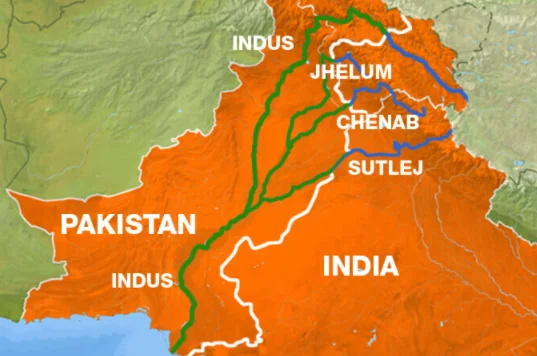India must leverage the Indus Water: The fact, however, remains that the provisions of the treaty entitled for India on the western rivers remain woefully unutilized both in terms of storage capacity and hydropower generation.
The Indus Commissioners of India and Pakistan will meet in New Delhi on March 23 and discuss, not surprisingly, concerns over the designs of hydropower projects on the Chenab in Jammu and Kashmir. This is the 116th meeting since the Indus Waters Treaty (IWT) was signed in 1960.
To buy our online courses: Click Here
Coincidentally, it comes in the backdrop of Pakistan army chief QJ Bajwa call for creating a “conducive environment” for the resumption of dialogue, and the possibility of foreign ministers of both countries meeting on the sideline of the Heart of Asia conference in Dushanbe later this month.
Read More: Why Quad alliance is a turning point for India-China ties
A notable feature of IWT was the establishment of Permanent Indus Commission (PIC), with one commissioner from each country to implement the treaty as well as settle differences and disputes by agreement, neutral expert, court of arbitration or any other manner as agreed. The commissioners have met at least once a year except in 2020, when the meeting was cancelled due to Covid-19.
India has shown remarkable compliance with the treaty. One can equally argue that India has often miscalculated its generosity. India’s leadership and water development planners in the 1970s lost much ground to Pakistan on the interpretation of IWT when it came to various projects on the western rivers (Indus, Jhelum and Chenab). India conceded to Pakistan’s objections, for example on the Salal hydroelectricity project and then later the Tubule navigation. The adjustment on the height of the Salal resulted in huge siltation of the dam and the Tubule waterway even till today remains shelved.
India felt that the spirit of the treaty was far more important to the overall peace and security in the region. For Pakistan, the format of the treaty gives it a context to question many of the projects. A prosperous and developed Kashmir increasingly assimilated to mainstream India is anathema to Pakistan leadership and it used the treaty to block progress.
Interestingly, the framework for arbitration would not have come about had it not been for Zulfikar Bhutto, the Oxford-educated lawyer who had joined Pakistan president Ayub Khan’s cabinet as the minister of water, power, communication and industry. Bhutto played an active role in the final phase of the Indus treaty negotiations but more significantly, his statement in the United Nations (UN), as a member of the Pakistan delegation, drew a crucial link to arbitration. A Soviet draft resolution on the question of defining aggression was put forward in the UN General Assembly in October 1957, and Bhutto said that “economic aggression or indirect aggression is perpetrated if lower riparian are deprived of natural rights in use of rivers which flow through two or more countries.”
The fact, however, remains that the provisions of the treaty entitled for India on the western rivers remain woefully unutilized both in terms of storage capacity and hydropower generation. After the effective abrogation of Article 370 of the Indian Constitution, the current government, which realizes water as a mean to socioeconomic ends, has fast-tracked a number of multi-purpose river projects in Kashmir.
Recently, the Cabinet approved ₹5842 crore investment for the 850 MW Rattle project. The NHPC expects to install 3800 MW of projects with an investment worth ₹2,300 crore for J&K. It is estimated that hydropower on the Chenab will triple in the coming years. India has done well in recent times to communicate, in no uncertain terms, to the international community and even to the World Bank, as the third party to the treaty, that riparian sympathy towards Pakistan is misplaced.
The PIC format has become rather predictable, with Pakistan monotonously accusing India of water harm. Perhaps, it’s time to infuse some fresh thinking. India can take the lead by expanding the debate to benefit sharing such as waterways, water wastage, water efficiency or even setting up a study group to assess socio-economic gains and losses from the Indus basin in the coming years. This can help the farming and business community in Pakistan to build pressure on their establishment to adopt a more reasonable approach.




